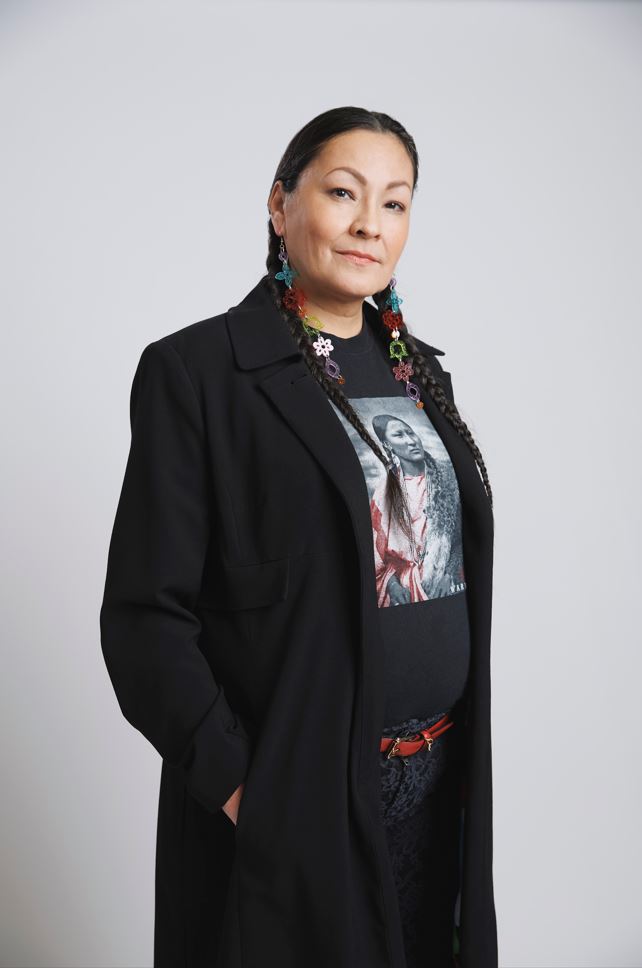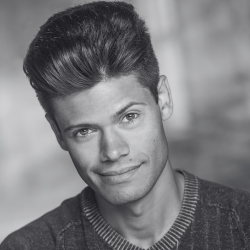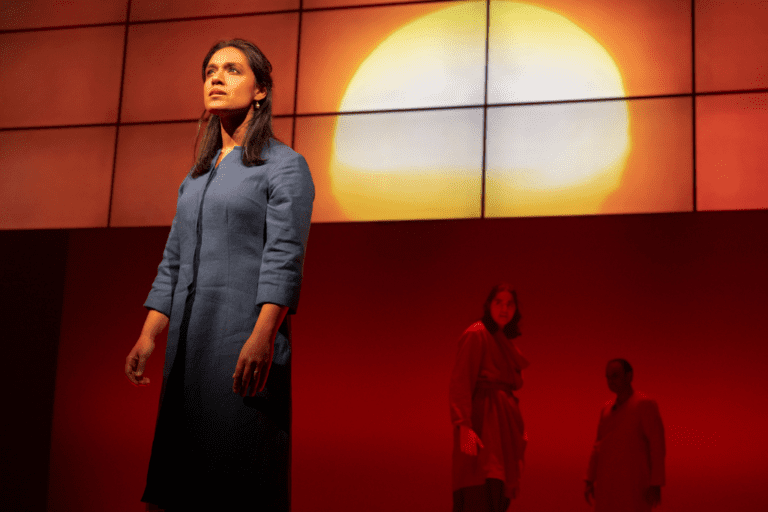In Rosanna Deerchild’s The Secret to Good Tea, laughter is a crucial part of the brew
At the beginning of 2020, Rosanna Deerchild had no ambition to be a playwright.
Just five years later, the accomplished poet and journalist’s play The Secret to Good Tea is about to receive its second outing in a co-production between National Arts Centre Indigenous Theatre and London’s Grand Theatre. Renae Morrisseau, director of the play’s 2023 world premiere at the Royal Manitoba Theatre Centre, has returned for the remount.
The Secret to Good Tea begins at a kitchen table, where, over a pot of the titular brew, a radio host named Gwynn (played by Michelle Bardach) attempts to reconnect with her mother Maggie, a residential school survivor (played by Marsha Knight). Surrounding mother and daughter are a supporting cast of characters played by James Dallas Smith, Jeremy Proulx, Emily Solstice Tait, and Kelsey Wavey; they offer the central pair a blend of help, hindrance, and insight.
The Secret to Good Tea echoes Deerchild’s own journey with her mother, who herself survived the genocide perpetrated by Canada’s residential schools. Before writing the play, Deerchild had already reflected on her mother’s residential school experience, in a 2015 poetry collection entitled calling down the sky. “That book of poetry started out of the Truth and Reconciliation Commission’s work,” said Deerchild in an interview. “When they were in Winnipeg, [my mother] did not want to go. She was like, ‘No goddamn way I want to talk about that.’ But eventually we went.
“When we got there, there were so many people that wanted to share their stories that there just wasn’t room for her in the circle — which seems like a crazy thing to say, because I always say that there’s always room in the circle for more people,” Deerchild continued. “But there wasn’t room for her that day. So I took her down by the river here in Winnipeg, at the Forks. I told her that we could have that conversation between us, and that she could share her truth with me, and that I would never let it be silenced again.”

While calling down the sky was a testament to her mother’s truth, The Secret to Good Tea “came out of my desire to speak my own truth, as a residential school survivor’s daughter,” explained Deerchild. “I wanted to focus more on the evolution, the reconciliation — however you want to word that — of our own difficult relationship. [My mother] struggled… with many of the things that survivors go through, in terms of being able to express love [and] affection beyond meals, beyond clothing, beyond braiding my hair. Kids don’t necessarily see the love in actions; they need the words. So this play was the words.”
But those words may never have made it to the stage if it wasn’t for Ian Ross, the Métis/Ojibwe writer whose play fareWel won the 1997 Governor General’s Award for Drama. In 2020, he invited Deerchild to take part in the inaugural Pimootayowin Creators Circle, an Indigenous playwriting program supported by the Royal Manitoba Theatre Centre. (Pimootayowin means “journey” in Anishinaabemowin.)
“Never in my mind did I think, ‘Someday [Ian Ross] is going to teach me how to playwright,’” chuckled Deerchild. “But he gave me a call one day, and he’s like ‘Hey, Rosanna, do you want to join this loose circle of writers I’m bringing together to talk about playwriting? Maybe we’ll write a play.’ He said ‘we.’ To me that meant, we were going to get together and write a group play.”
No such luck.
“He fooled me! He tricked me! He lied to me, if you will,” Deerchild joked. “Instead, he had us all write our own plays. I was like, ‘Oh shit!’ Because I’d never written a play. I had no idea how to write a play. But I have this problem where I can’t say no to creative endeavours.”
Deerchild said that she’s come to call Ross “Ojibwe-Wan Kenobi. He was such a gentle leader. Fun, funny, wise, wise-cracking, and just lovely to learn from. One of his favourite things to do was say, “I’m going to tell you a quick story, just a quick story!” Then he’d talk for 25, 30 minutes.” Through that story, “he’d tell us certain ways of how to write a play,” Deerchild said. “You learn by listening.”
The characters in The Secret to Good Tea learn by listening, too. “Gwynn is an overachiever,” said Deerchild. “She feels like she has to take care of everybody and make sure everything is perfect. But meanwhile she’s struggling in her own marriage, and she probably drinks a little bit too much wine. She’s a workaholic.”
When Gwynn urges her mother Maggie, played by Marsha Knight, to speak to the Truth and Reconciliation Commission about her experience of residential school, “that’s the breaking point for them,” continued Deerchild. “They have to go back and start repairing. Gwynn has to ask, ‘Why do I want to know this? Why do I want to poke at that wound? Is it anger? Is it healing? Then they have to work towards finding that truth in their own relationship, and hopefully finding the truth in the bigger sense of that word.”
Once that truth has been shared, the question remains of what to do with it — both in the play, and the real world. “It’s so easy for people to hear a story [and say] ‘Oh, that was so hard to hear,’ and then go on with their lives,” reflected Deerchild. “What do you do with that story? We have survivors who have held onto their stories for 50, 60 years… It’s our truth, and it’s the history of all of Canada: yours, mine, non-Indigenous people, newcomers… This is a hard truth that we have to accept as a nation: that we did this, right? So what are we going to do with those stories?”
Moreover, Deerchild continued, “What are we as Indigenous people doing with these stories of our ancestors? How are [we] taking care of them — not just the stories, but our ancestors? Who’s taking care of our elders? My mother lives with me, so I’m literally taking care of my elders,” she joked, “But how are we doing that as a society?”
That last sentence is a perfect example of how Deerchild uses humour to approach vital questions. In The Secret to Good Tea, Gwynn and Maggie may have reached their boiling point, but that doesn’t mean the play isn’t filled with laughter, and love.
“Humour is everything,” said Deerchild. “Indigenous people are funny. We’re fucking hilarious. You can beep that out if you like.
“If you get two or three Indigenous people in the same room, somebody is going to start making jokes. We have a lot of trauma, but we also have a lot of laughter and joy. In the Indigenous worldview, that balance is really important. When you become imbalanced, then that’s when the wounds start. That’s when the poison starts to spread. That’s when you’re affecting other generations. You’ve got to get it together and laugh as much as you cry.”
The Secret to Good Tea runs from February 18 to March 8 at the Grand Theatre. Tickets are available here. Click here to learn about the Grand Theatre’s Indigenous Community Ticket Program.
The National Residential School Crisis Line provides 24-hour crisis support to former Indian Residential School students and their families toll-free at 1 (866) 925-4419.













Comments